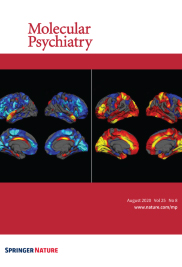Mol Psychiatry. 2020 May 7. doi: 10.1038/s41380-020-0758-9. [Epub ahead of print]
Steenblock C1, Todorov V2, Kanczkowski W2, Eisenhofer G2,3, Schedl A4, Wong ML5, Licinio J5, Bauer M6, Young AH7, Gainetdinov RR8,9, Bornstein SR2,10.
Author information
1 Department of Internal Medicine III, University Hospital Carl Gustav Carus, Technische Universität Dresden, Dresden, Germany. charlotte.steenblock@uniklinikum-dresden.de.
2 Department of Internal Medicine III, University Hospital Carl Gustav Carus, Technische Universität Dresden, Dresden, Germany.
3 Institute of Clinical Chemistry, University Hospital Carl Gustav Carus, Technische Universität Dresden, Dresden, Germany.
4 Université Côte d’Azur, INSERM, CNRS, iBV, Nice, France.
5 State University of New York, Upstate Medical University, Syracuse, NY, USA.
6 Department of Psychiatry and Psychotherapy, Carl Gustav Carus University Hospital, Technische Universität Dresden, Dresden, Germany.
7 Centre for Affective Disorders, Department of Psychological Medicine, Institute of Psychiatry, Psychology & Neuroscience, King’s College London, London, UK.
8 Institute of Translational Biomedicine, St. Petersburg State University, St. Petersburg, Russia.
9 St. Petersburg State University Hospital, St. Petersburg State University, St. Petersburg, Russia.
10 Diabetes and Nutritional Sciences Division, King’s College London, London, UK.
Abstract
Severe acute respiratory syndrome coronavirus 2 (SARS-CoV-2), first identified in December 2019, causes coronavirus disease 2019 (COVID-19). It is reasonable to presume that SARS-CoV-2 infection will cause activation of the endocrine stress axis at several levels. The endocrine stress system involves communication among different tissues, including among others, the brain and components of the hypothalamic-pituitary-adrenal (HPA) axis. Dysregulation of the stress system leads to morphologic changes in target organs or epigenetic stem cell changes. These in turn might contribute to the development or exacerbation of various psychiatric disorders. We discuss here the potential impact of an infection such as SARS-CoV-2 on a systemic level and reflect on its potential influence on the endocrine stress axis and the consequent long-term consequences. As SARS-CoV-2 and its host receptor, angiotensin-converting enzyme 2 (ACE2), both impact the HPA axis, we also discuss potential therapeutic strategies.
PMID: 32382135
DOI: 10.1038/s41380-020-0758-9

